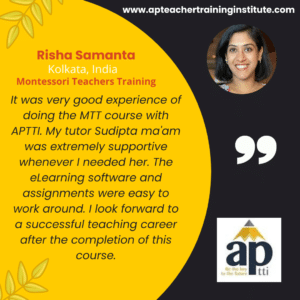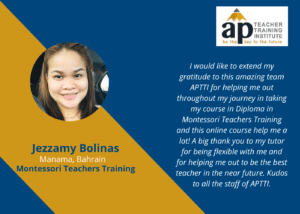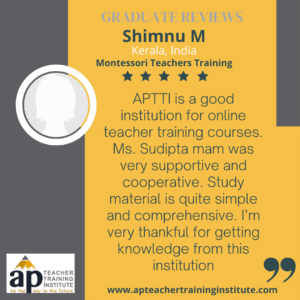A Guide to Choosing the Right Teacher Training Course
The Montessori method of education is renowned for its child-centric approach, where students are empowered to be independent and engage in self-directed activities. Established by Dr. Maria Montessori in the early 20th century, this method emphasizes hands-on, collaborative learning and has found its place in numerous schools across the globe. If you’re considering becoming a Montessori teacher, you’re probably curious about the best teacher training course or Montessori Teacher Training course available. Here’s a comprehensive guide to help you navigate the choices:
-
International Montessori Diplomas:
These globally recognized certifications offer Montessori Teacher Training Courses in the Montessori method. They are suitable for those aiming to teach in different countries. Training typically covers philosophy, pedagogy, and practical applications.
-
Age-specific Montessori Teacher Training Course:
Training often varies based on the age group of children you aim to teach.
Infant and Toddler (0-3 years):-
Focuses on the fundamental needs of very young children, such as motor skills development, language acquisition, and fostering independence.
Primary (3-6 years)
This training delves deeper into Montessori materials, classroom management for preschoolers, and foundational subjects like math, language, and cultural studies.
Elementary (6-12 years)
A more advanced training, focusing on the broader curriculum – math, language arts, biology, history, and geography – as well as child psychology at this age.
Adolescent (12-18 years)
This is for those wishing to work with older students. The training is complex, blending Montessori principles with the unique needs of adolescents.
-
Online vs. On-site Teacher Training Course:
Online Teacher Training Courses
Online Teacher Training Courses are great for individuals who need flexibility. They often include video lectures, virtual demonstrations, and online assessments. However, they might lack the hands-on experience crucial for mastering the Montessori approach.
On-siteTeacher Training Courses
Typically held in established Montessori institutions, these courses offer direct, hands-on experience with Montessori materials, face-to-face interactions, and often, a practicum in a Montessori classroom.
-
Montessori Workshops and Short Courses:
Several organizations offer workshops or short courses for those not seeking a full-fledged certification but still wanting to incorporate Montessori principles in their teaching or parenting style. These might last a weekend or several weeks and will cover fundamental Montessori concepts.
Specialized Montessori Teacher Training Courses:
Beyond general Montessori teacher training, there are courses focusing on special education, language immersion, or integrating Montessori with other educational philosophies. These are ideal for educators wishing to blend Montessori with other approaches or cater to specific student populations.
Choosing the Right Teacher Training Course: Here are some factors to consider:
Accreditation
Ensure the course is accredited by a recognized Montessori association.
Course Duration and Commitment
Some teacher training courses are intensive, spanning a few months, while others might be spread out over a year or more. Choose based on your availability and dedication.
Hands-on Experience
For the Montessori method, practical experience is invaluable. Ensure your chosen course provides ample opportunities for hands-on training, ideally in a real classroom setting.
Faculty
Investigate the qualifications and experience of the instructors. Learning from seasoned Montessori educators can significantly impact your training quality.
Budget
Costs vary widely based on the course’s length, the reputation of the teacher training institution, and the country or city where it’s offered. While investing in quality education is crucial, ensure the course fits within your financial boundaries.
In conclusion, the path to becoming a Montessori teacher is as diverse and individualized as the method itself. By understanding the various courses available and aligning them with your professional goals and personal circumstances, you can embark on a rewarding journey toward shaping young minds in the Montessori tradition. Whatever path you choose, the core Montessori principles of respect, independence, and love for learning will guide you.





